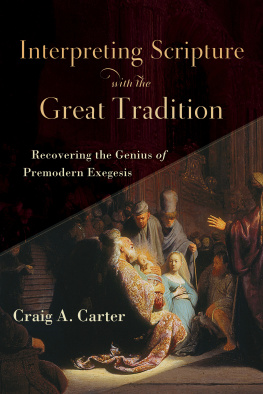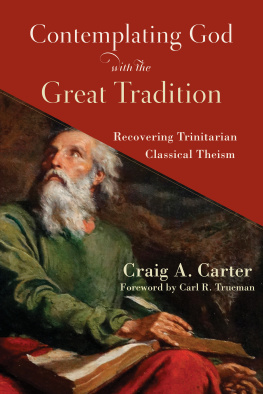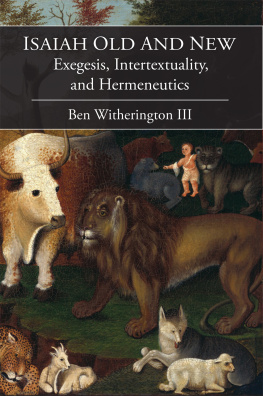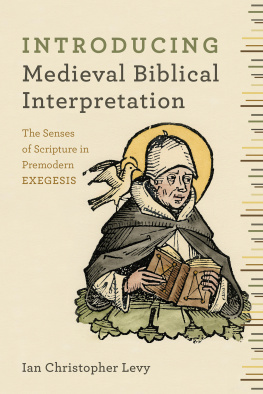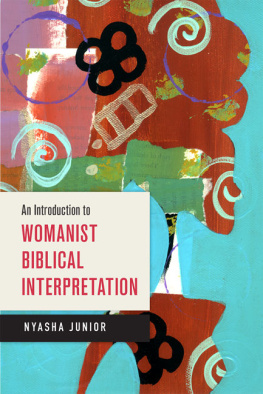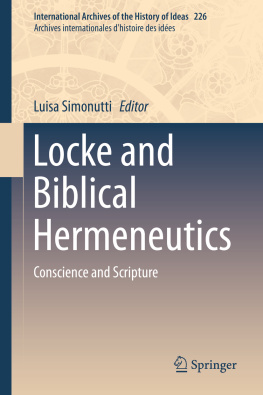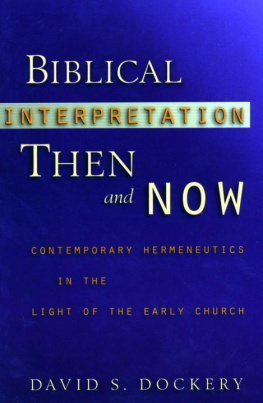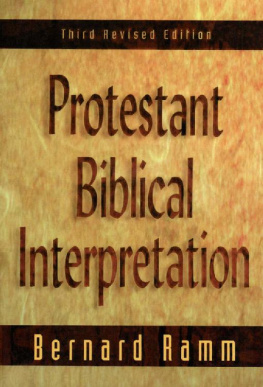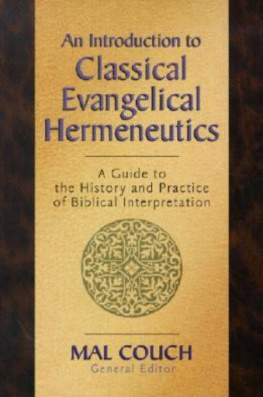beloved mentor and teacher, who spoke and wrote so profoundly about our God and who now beholds him face to face
I thank my God upon every remembrance of you.
(Phil. 1:3 KJV)
Contents
Cover
Title Page
Copyright Page
Dedication
Preface
Acknowledgments
Abbreviations
Introduction
1. Who Is the Suffering Servant? The Crisis in Contemporary Hermeneutics
The Gulf between Academic Hermeneutics and Church Preaching
How Such a Gulf Developed between Church and Academy
Can This Gulf Be Overcome? Promising Developments in Recent Scholarship
The Argument of This Book
Part 1: Theological Hermeneutics
2. Toward a Theology of Scripture
The Inspiration of Scripture
The God Who Speaks
The Word in the Words
3. The Theological Metaphysics of the Great Tradition
What Is Theological Metaphysics?
Why Christian Platonism?
How Is Christian Platonism Related to Platonism in General?
The Modern Rejection of Christian Platonism
The Orthodox Consensus: Exegesis of Scripture in the Great Tradition
The Great Disruption: Exegesis of Scripture in Modernity
How the Narrative Needs to Be Revised
Part 2: Recovering Premodern Exegesis
5. Reading the Bible as a Unity Centered on Jesus Christ
Biblical Interpretation Is a Spiritual Discipline: Ambrose of Milan
The Apostles Are Our Models: Justin Martyr
The Rule of Faith Is Our Guide: Irenaeus
Summary and Conclusions
6. Letting the Literal Sense Control All Meaning
The Spiritual Meaning Grows out of the Literal Sense: Augustine
All Meaning Is Contained in the Plain Sense: The Tradition from Origen to John Calvin
Summary and Conclusions
7. Seeing and Hearing Christ in the Old Testament
Prosopological Exegesis: A Primer
Augustines Christological Interpretation of the Psalms
The Christological Literalism of the Great Tradition as Scientific Exegesis
Conclusion
8. The Identity of the Suffering Servant Revisited
Three Treatments of Isaiah 53: Goldingay and Payne, Motyer, and Childs
A Sermon on Isaiah 53 and Some Reflections on It
The Evangelicals and Evangelicals Together Project: The Perils and Promise of Theological Interpretation of Scripture
Appendix: Criteria for Limiting the Spiritual Sense
Bibliography
Index of Scripture
Index of Persons
Index of Subjects
Back Cover
Preface
T he conventional wisdom concerning biblical hermeneutics among the vast majority of evangelical biblical scholars today goes something like this:
We should interpret the Bible like any other book. The sole purpose of exegesis is to try to understand what the original author meant to communicate to the original audience in the original situation. The text has only one meaningnamely, what the original, human author meant to say. Allegorical interpretation is dangerous because it allows people to read any meaning whatsoever into the text. Maintaining a commitment to the authority of the Bible depends on not departing from the single meaning of the text discovered by historical study. The purpose of a college or seminary education is to train future preachers and teachers in the historical method. It is not the responsibility of the scholar to determine the meaning of the text for today. It is the job of the preacher, teacher, or individual reader to decide how the gap between the ancient meaning and the contemporary situation should be bridged. This is called application, and it is not the job of the biblical scholar qua biblical scholar to do it, although as a Christian, a biblical scholar must figure out how to apply the text to the present just like everyone else. A scholars expertise as a scholar, however, is an advantage only insofar as it enables a clear determination of the original, historical meaning of the text.
In this book, I argue that every single component of the conventional wisdom described in the above paragraph is wrong or, at the very least, highly misleading. I argue that we must interpret the Bible in a unique manner because it is uniquely inspired. The purpose of exegesis is to understand what God is saying to us today through the inspired text. The text may have one or several meanings because of the complexity of God the Holy Spirit inspiring the text through a human author. The authority of the Bible is Gods self-authenticating Word speaking through it, and in order to hear Gods Word, it is crucial that we interpret it as a unified book with Jesus Christ at its center. The interdisciplinary practice of biblical studies as found in academic settings today is an agent of secularization in the church and needs to be reformed so that it becomes a servant of Christian theology and spirituality rather than a confusing amalgam of history, philology, archaeology, literary theory, sociological theory, and philosophy operating with unacknowledged metaphysical assumptions and without any material center. The meaning of the text for today is what we seek to hear as we study the text carefully, intensively, and reverently. Biblical exegesis is a spiritual discipline by which we are gradually made into the kind of readers who can receive with gladness the Word of God. Ancient reading practices, which have never died out completely in the church, can help us hear Gods Word in less subjective and more ruled ways than modern hermeneutics makes available to us.

